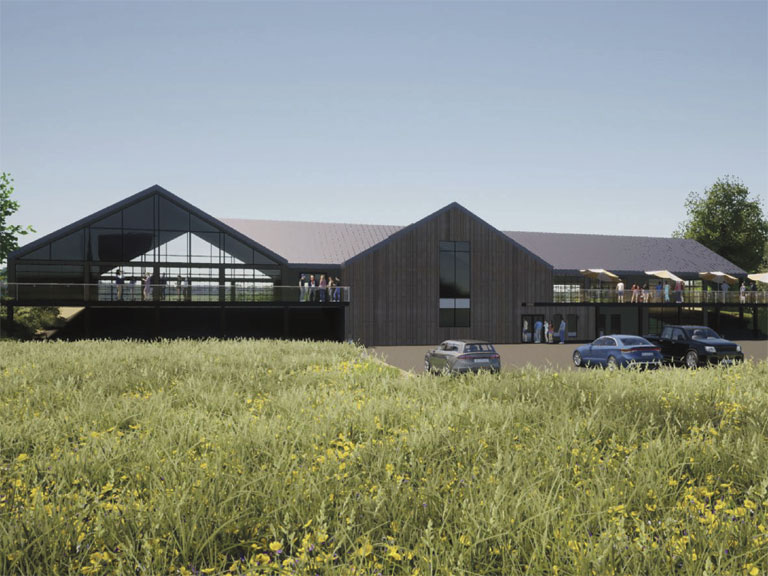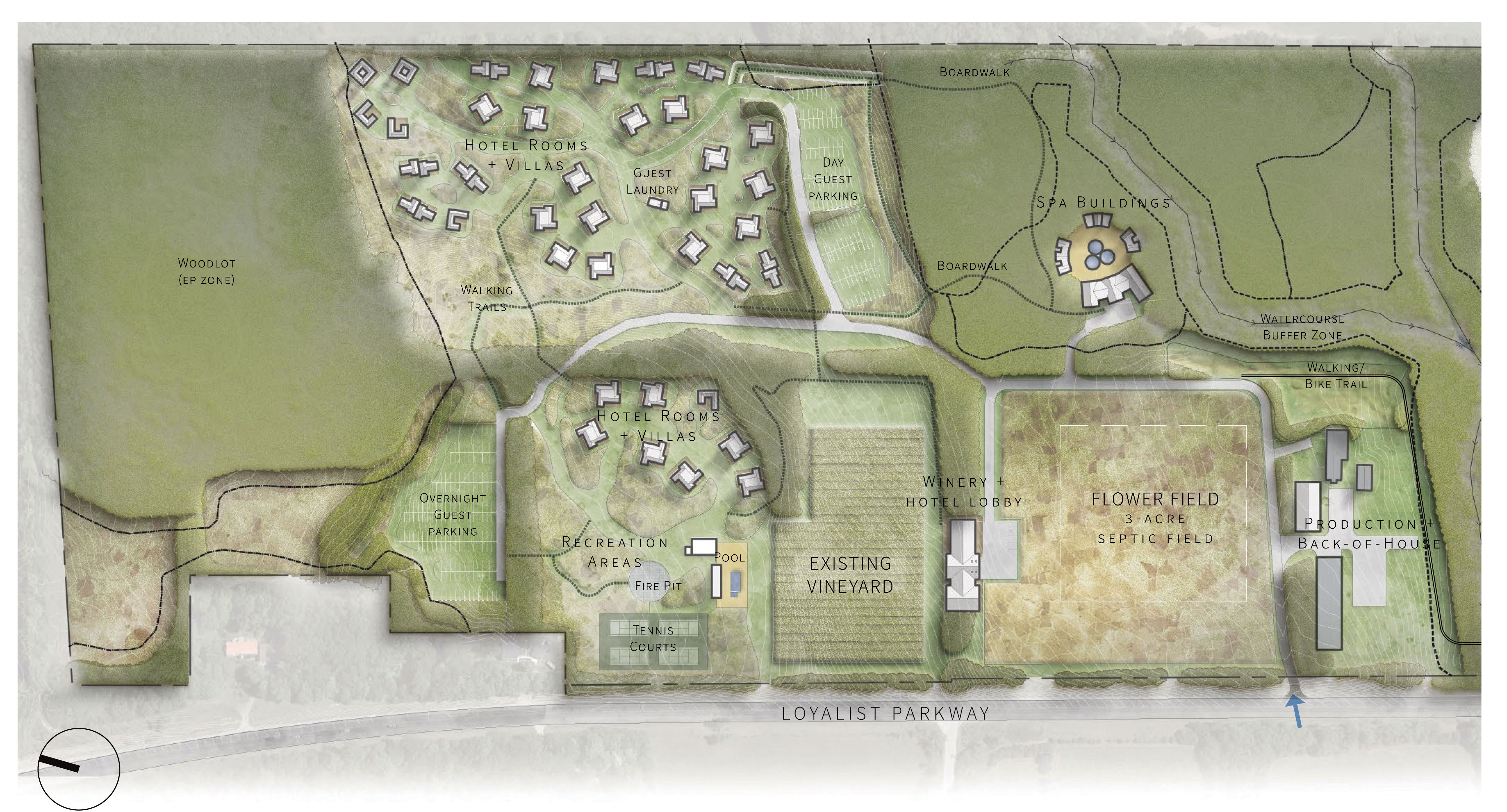County News
Phase one

Redtail Vineyard expansion gets planning approval
Phase one of Redtail Winery’s new resort development on Loyalist Parkway in Hillier received approval at this week’s Planning Committee Meeting. An Official Plan amendment and re-zoning were approved under the 2006 Official Plan as the the plans were first presented in 2019, before the County’s new Official Plan was complete.
The first phase will see an estate winery with restaurant, two event venues, a retail space, 74 hotel units and a spa, pools, saunas and a cafe. The second phase of the proposed development, if approved, would see the addition of another 74 hotel units.
Adam Layton, a planner with Evans Planning, gave a presentation to Council, He noted the hotel accommodations, winery, restaurant and spa account for a minor percentage of the property and all are located north of the watercourse. “The majority of the site— well over 50 per cent—is to be maintained as both the agricultural or open space as a natural feature condition, with 0.88 hectares of new feature areas to be replanted,” said Layton.
He added that 13 test wells have been drilled on the north end of the site to try to determine water sources. He said at least three wells provided viable results. “We are satisfied there is a sufficient supply of potable water that could support the hotel and spa use,” he said. “It has been noted vineyards do not require any irrigation, and in times of extreme drought, water could be trucked in during the summer months and the production season, if necessary.”
At the meeting, many neighbours of the development voiced concern about the scale, environmental impact issues, traffic, and largely about the amount of water needed for day-to-day operations. Charles McKee, who lives directly across the road from the development, said that he wasn’t objected to the concept. “We as a community know that we are troubled by the lack of accommodation in the community,” said McKee. “But there are clearly a lot of potential impacts to the environment.”
As the hotel and resort is estimating it will use 44,000 litres of water per day, McKee urged Council and staff to stick close to the conditions to long-term yield on water, including a detailed hydrogeological assessment.
Loyalist Parkway resident Sean Ramsbottom told Council his property is surrounded by the future development. Ramsbottom was concerned about the effect on his property’s value, as well as quality of life. “I get the pleasure of living next to a parking lot and tennis court and basketball court,” he said. Ramsbottom also noted that 80 per cent of the year, he has to truck in water for a his dry well.
Dee Hazell is a neighbour on Partridge Hollow Road. She was surprised the plan had gotten this far. “When I first saw the extent of this proposed development back in 2019, I was gobsmacked. How could anyone think this type of development and its size were suitable for this rural area?” she asked. Hazell noted that the farmland, along with the woods and robust treelines will not be protected. “There are woods in the area. These are robust treelines for wildlife and protection of farmland for erosion. Not for hotels and spas,” said Hazell. “The County already has so many special event venues, wedding venues along with a few conference centres. I don’t think we need anymore.”
Duarte Da Silva, Executive Director of PECWA, said that his organization is supportive of the much-needed purpose-built tourist accommodation. “ A year-round resort attached to a major vineyard and winery will benefit the area and industry yearround and encourage shoulder season visits. This project will create much-needed year-round employment for residents of Prince Edward County.”
County Planner Matt Coffey told Council the application will require a site plan control application and staff are recommending holding provisions on the zoning applicable to two phases of the development that impact the hotel.”The reason for the hold is because through the peer review process for the applicant’s hydrological work it was determined additional work is required,” said Coffey. Five recommendations were developed from the peer review, along with comments from Quinte Conservation that they would like the applicant to complete before removal of the hold is approved. “There are some pretty strict requirements on what the next phase of this development is,” he noted.
This made Councillor Brad Nieman ask for clarification whether the site plan approval would go to delegated authority or back to Council. Coffey explained that the approval will go through delegated authority, but the removal of a hold provision needs a bylaw amendment for each phase that has the potential to come back to council.
Manager of Planning Mike Michaud explained that Bill 109, the More Homes for Everyone Act, which came into effect earlier this year, changed the process. “Bill 109 indicates that site plan approvals are now delegated to staff so the actual site plan will not come forward to Council for final approval; however, part of our site plan approval process is to circulate to Council the documentation of the site plan when it does come in so you have the ability to ask question, find out more information, glean more information from the residents to help us build a case for supporting the site plan,” said Michaud.
Councillor Ernie Margetson noted that water is an important issue, and acknowledged all of the audience comments regarding such. “I personally don’t accept trucking water as an alternative to having water onsite to supply development when it is being proposed,” said Margetson, who then noted staff can insist more work be done throughout the process. “I supported this because I feel they did the background work to get to this stage of the planning review. You have recommended approval, which is important to me and my support. They do have to do more work to get to actually site plan approval and then building permit stage.” added Margetson.
Agreeing with that statement was Councillor Janice Maynard, who said she hopes that the site plan control works the way it should. “It’s been quite a few years since we have seen the very first version of this development. What we see now has very little, if any, resemblance to that. This is a pretty drastically different version,” said Maynard. “We don’t allow someone that is getting a severance for a rural home to preface their ability to have a severance or to build with trucked-in water. What measures can we put in place to make sure that is not going to happen?” she asked.
Coffey explained that it is hard to compare this project to a residential project. “This is a commercial use so there are two different factors. A residential dwelling requires a minimum of three gallons a minute of potable water. Commercial developments don’t necessarily have to meet that standard, but they are trying to at least establish that it is feasible,” he said, and then noted there wasn’t a way to not allow trucked in water.
“This is a higher level review,” said Michaud. “Through the site plan we will be very vigorous in getting a hydrogeological study to a point where we are very comfortable with all the units and all the other uses including the agriculture component, have enough water to support all of those uses. If they don’t then they will need to amend their site plan,” he said.
Councillor John Hirsch had some concerns, but ultimately felt this was the type of development the County has been awaiting. “This is the type of tourist accommodation that is going to help alleviate the pressure on short-term accommodation issues which we are all to well aware of,” said Hirsch.
Councillor Bill Roberts agreed and added to Hirsch’s point. “For at least eight years there has been a lot of discussion about achieving a goal which the County has talked about for longer than eight years, which is becoming a year-round destination with year-round jobs. We have been talking about ‘how do we attract investment.’ ‘How do we attract innovation to create that year’round business with those year-round jobs.’ I know this alone won’t make the County a winter destination, but it’s possibly a start if we put the right guardrails on, put the right protections in place and are extremely rigorous in how we implement this,” he said.


Comments (0)